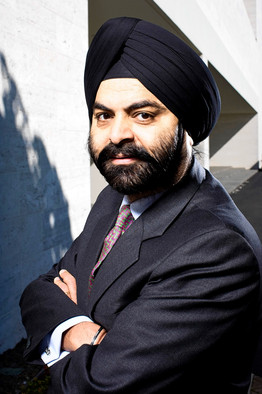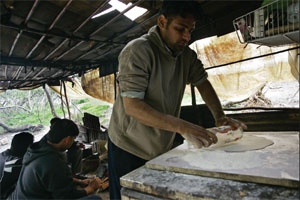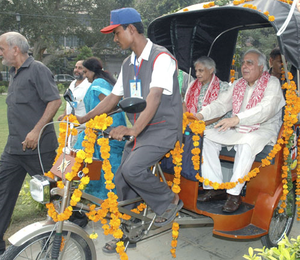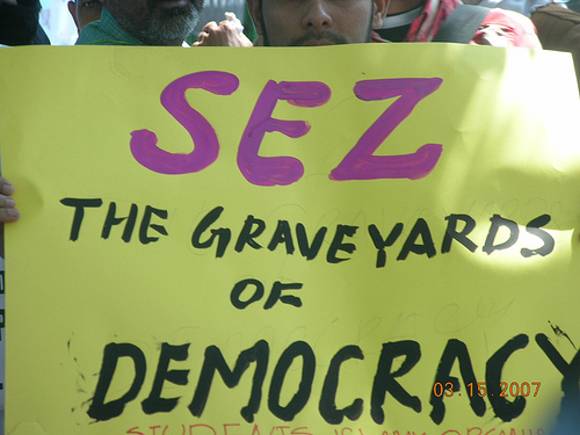
Co-blogged by Sundari and The Sikh Love Stories Project
Each year, International Women’s Day is celebrated to honor women’s economic, political and social achievements. As individuals around the world celebrate this day – in both big ways and small – I am left to consider how we can work to honor the achievements of Sikh women not only today but on an ongoing basis.  Sikh women have contributed in such meaningful ways, and yet much of that dialogue is often missing from our history.
In this post, we will be sharing some images with you and discuss various ways Sikh women have been witness to and engaged in our history both locally and globally.  We know this post will not be comprehensive – there is much to unearth about Sikh women’s contributions – but we hope it’s a starting point that will encourage us to keep this valuable history in our minds. Many of the following images each depict a different element of Sikh women in history.
Stories often begin with immigration and this first image shows Sikh women pioneers in Canada who were part of an immigrant labor force recruited in the early years of the twentieth century.
Mill Town Pioneers. Most of Canada’s early Sikh immigrants found work in lumber mills throughout the Pacific Northwest.
Canada’s largest mill community, Fraser Mills in New Westminster, BC, had between 200 and 300 Sikhs living and working there in 1925.
In this photograph from that period, three Sikh women stand in front of company houses at the mill. [link]
One of them wears a traditional embroidered shawl called ‘phulkari’. The phulkari played an important role in the lifecycle rituals of women in Punjabi villages at times of birth, marriage and death.
I just got an email from the Working Families Party (a progressive political party in NYC) about the latest developments in mega-corporation Walmart’s latest attempts to set up shop in NYC. One of the biggest real estate development companies in the city called Related is reportedly in discussions with Walmart about building its first NYC store in the Brooklyn neighborhood of East New York. The below video put together by ALIGN, the Alliance for a Greater New York, features a Sikh business owner, Iqbal Chhabra.

This video warmed my heart for several reasons. It goes without saying that I live in Brooklyn and am concerned with all things Brooklyn. Brooklyn is not exactly known for its large Sikh population. I see the occasional Sikh construction worker or shop owner, but I don’t know of too many other Brooklynwale Singhs or Kaurs. So I was pleasantly surprised to see Mr. Chhabra speaking out about an important Brooklyn-based issue in this video.
As the world celebrates the 41st Earth Day on April 22nd, to raise awareness about the state of the global environment (now recognized worldwide as International Mother Earth Day) the Punjab government this week announced that it would issue strong penalties on the use of polythene bags less than 30 microns in size (th ink of it this way, a piece of hair is about 50 microns across). The statement warns of strong penalties for violations of the Punjab Plastic Bags Control Act a regulation initially passed in 2005, barring the manufacture and distribution of the smallest polythene. Bags 30 microns and smaller have been stressed because they are more likely to fly through the air to lands and public waterways. Polythene bags above this size will continue to be manufactured. Violators could face up to three months in jail.
ink of it this way, a piece of hair is about 50 microns across). The statement warns of strong penalties for violations of the Punjab Plastic Bags Control Act a regulation initially passed in 2005, barring the manufacture and distribution of the smallest polythene. Bags 30 microns and smaller have been stressed because they are more likely to fly through the air to lands and public waterways. Polythene bags above this size will continue to be manufactured. Violators could face up to three months in jail.
Plastic bags contribute to Punjab’s solid waste problem, one of the state’s growing challenges due to the number of small-scale industries producing disposable, manufactured goods. With the agricultural economy on the decline and the deflation in the price of agricultural land hitting rural areas hard, migration to urban areas and the demand for consumer products has increased the production of solid waste in recent years. Of all Punjab’s cities, Ludhiana produces the greatest amount of solid waste from urban and industrial units, followed by Patiala, Jalandhar, and Amritsar, each seeing a rise over the past two decades. Waste from small commercial units dump non-biodegradable waste right onto street, which can pose serious environmental health challenges. (Under U.S. law, we classify these lands as ‘Superfund’/’Brownfield’ sites indicating the presence of hazardous and otherwise harmful substances.)
Since the Green Revolution was introduced in the mid-1960s, the Sikh spiritual homeland of Punjab has been faced with mounting soil erosion, water table decline, widespread chemical contamination, and continued loss of biodiversity in agriculture and forests. The Cold War era anti-revolutionary plan transformed Punjab into the breadbasket of the Indian nation state but left Punjab’s ecology in a critical state and set the agricultural economy on a path of long-term decline. Without Sikh institutions on board with the ecological reality of Punjab, the serious degeneration of the environment will continue to accelerate, and the marginalized and the poor will burden the costs of shortsighted statist policies that have exploited the natural resources of Punjab.
The week of March 14, the Gurpurab of Guru Har Rai Ji, Gurudwaras across Punjab and the Diaspora will participate in the first ever global day of reflection on the environment to reach the masses in Punjab and the world. On ‘Sikh Environment Day’ Gurdwaras across the world will focus kirtan and katha on the environment, participate in tree plantings, install environmental notice boards, start pesticide-free vegetable gardens, and host Khalsa School lessons on the environment. The SGPC, DSGPC, AGPC, are all in support of this day and celebrations will be underway at Anandpur Sahib (‘pani bachao, rukh lagao!’). We have prepared a Gurdwara Guide and shabad compilation for participating Gurudwaras and the Sikh Research Institute has also created Sikh environmental education lesson for Khalsa Schools across the diaspora.
Major outreach efforts are underway across the world, but WE NEED YOU to invite your Gurudwaras to join Sikhs across the world. Please take ten minutes of your day, ‘like’ EcoSikh on facebook, download an English or Punjabi versions of our invitations, pass them on to your Gurudwara heads, and encourage your Gurudwara to REGISTER today. We can make this happen for the future generations and create a shift in thinking on the serious degradation of Punjab’s rural and urban ecology before the process becomes irreversible.
Please visit www.ecosikh.org to learn more about Sikhism’s contribution to a sustainable future. May the Khalsa ever remain spiritually exalted, and always in service of humanity.
 Here on TLH we’ve often highlighted the accomplishments of Sikhs in various sectors of the community. A recent article in the Wall Street Journal discusses incoming MasterCard CEO, Ajay Banga. As of July 1st, Mr. Banga will be heading the second-largest credit- and debit-card processor. His job won’t be easy, particularly during these tumultuous times. Earlier this month, the Senate approved the financial-overhaul bill which includes provisions that could encourage consumers to use cash and checks over electronic payments. If the legislation is signed into law, it also could drain billions of dollars in annual revenue from the banks that issue cards branded with the MasterCard logo.
Here on TLH we’ve often highlighted the accomplishments of Sikhs in various sectors of the community. A recent article in the Wall Street Journal discusses incoming MasterCard CEO, Ajay Banga. As of July 1st, Mr. Banga will be heading the second-largest credit- and debit-card processor. His job won’t be easy, particularly during these tumultuous times. Earlier this month, the Senate approved the financial-overhaul bill which includes provisions that could encourage consumers to use cash and checks over electronic payments. If the legislation is signed into law, it also could drain billions of dollars in annual revenue from the banks that issue cards branded with the MasterCard logo.
For the past few months, Mr. Banga has been on a whirlwind tour to promote MasterCard to bankers in Asia, Europe and South America. He is encouraging company executives to follow his lead by getting out of their offices to spend time with customers around the world. About 55% of the company’s revenue comes from outside the U.S.
When he isn’t traveling, Mr. Banga slips into his silver Lexus on the Upper East Side of Manhattan each morning and drives about 45 minutes to MasterCard’s suburban campus in Westchester County. He listens to local radio news for the first 15 minutes and then mentally prepares for his day by switching to Sikh devotional music. [link]
Mr. Banga is known to be a “front-line” executive, and is referred to as being “energetic, open and engaging”. Indian-born Banga graduated with a BA in Economics Honors from Delhi University and is also a graduate of the Indian Institute of Management, Ahmedabad. Before arriving at MasterCard, Mr. Banga worked at Citigroup Inc. for 13 years, including some time in charge of the bank’s global credit-card business. Mr. Banga has an interest in social development issues, and over the period from 2005 to 2009, he spearheaded Citi’s strategy in the microfinance sector across the world. He has undoubtedly accomplished much in his professional career and hopefully will inspire young Sikhs to reach similar heights!
The bad economy has worried many of us. From losses on investments to lack of jobs, many of us worry about when the economy will turn around. Interestingly, the group most effected by high unemployment is youth. Last week, the Labor Department reported that youth unemployment stands at 18.2%, nearly twice the national average of 9.8%. The percentage of young people without a job is a staggering 53.4 percent, the highest figure since World War II. Those in the age group of 16-24 are most often the demographic who are hired for entry-level positions and groomed to take over high-level positions in the future.
Moreover, youth of color are disportionately effected by high unemployment. Nearly 40% of black youth (ages 16-19) and 30% of Latino youth (16-19) are unemployed versus only 23% of white youth. As youth of color get older, the gap widens-27.1% of black youth between the ages of 20-24 are unemployed versus 13.1% of white youth in the same age rage. This high unemployment rate for young people is startling because without more job opportunities, young people suffer not only in the short-term, but long-term. Their ability to attend college, afford healthcare, purchase homes, and save for retirement leads to long-term problems.
Rinku Sen and Billy Parish suggest in their joint article, that youth of color are the demographic who can most benefit from the new green jobs proposed by the Obama administration. These new jobs are proposed as a solution to both unemployment and saving our environment.
So Abercrombie & Fitch is at it again or I should say has been at it for a  while-practicing bias against those who “don’t look the part” of mainstream White American society. In Tulsa, Oklahoma, a college age Muslim girl who wears a hijab is filing suit against the retail store for not hiring her because she would violate the “Look Policy”.
while-practicing bias against those who “don’t look the part” of mainstream White American society. In Tulsa, Oklahoma, a college age Muslim girl who wears a hijab is filing suit against the retail store for not hiring her because she would violate the “Look Policy”.
What is Abercrombie & Fitch’s “Look Policy”? The policy jargon aside, the bottom-line for this retail store is that hijab’s aren’t “sexy” because mainstream White America doesn’t view them that way and only sex sells.
Now of course Abercrombie & Fitch will not outright say that; though I am sure they will fight to preserve this “status quo” through legal, “objective” and “logical” means. It also seems like the very legal right that is supposed to protect religious freedom will be used to defend Abercrombie’s stance. Title VII of the Civil Rights Act of 1964 prohibits religious discrimination. The 197 amendment to Title VII defines religion to,
“… include all aspects of religious observance and practice, as well as belief, unless an employer demonstrates that he is unable to reasonably accommodate an employee’s or perspective employee’s religious observance or practice without undue hardship on the conduct of the employer’s business”.
Blogged by: Amol Singh
 For many of us, the ability to live our lives in the diaspora is a direct consequence of journeys emanating from Punjab. Our fathers and mothers left economic insecurity and political uncertainty and set sail on ships and planes to far off backwaters in hopes of finding routes to the holy grails of North America and Europe. In today’s grapevine, it has become a casual affair to hear of Panamanian border crossings and Cuban raft rides. In a remarkable event, Spanish documentary film makers Alberto Garcia Ortiz and Agatha Maciaszek are currently in the process of filming the harrowing story of 54 Punjabi’s; who stranded in the Spanish city of Ceuta and fearing detention and deportation have fled and taken up refugee in the hills of the city.
For many of us, the ability to live our lives in the diaspora is a direct consequence of journeys emanating from Punjab. Our fathers and mothers left economic insecurity and political uncertainty and set sail on ships and planes to far off backwaters in hopes of finding routes to the holy grails of North America and Europe. In today’s grapevine, it has become a casual affair to hear of Panamanian border crossings and Cuban raft rides. In a remarkable event, Spanish documentary film makers Alberto Garcia Ortiz and Agatha Maciaszek are currently in the process of filming the harrowing story of 54 Punjabi’s; who stranded in the Spanish city of Ceuta and fearing detention and deportation have fled and taken up refugee in the hills of the city.
On your next trip to India, how will you travel? Train, car, metro? How about in a solar-electric powered cycle rickshaw? Because now you can. 
The Council of Scientific and Industrial Research, a government body, made a motor powered by a solar powered battery to decrease the effort required to pedal a cycle rickshaw. They call it a Solekshaw. It originally unveiled last year and has been testing in Delhi. [link] The Solekshaw can either be pedaled like a normal rickshaw or run on the solar powered battery for 30-42 miles before it needs to be recharged. Used batteries are recharged and replaced for a small fee at solar-powered stations. [Discovery]
Improvements on the original model are set to debut next year “with better aesthetics, ergonomics, speed and recumbent driving position.” [link]
The Solekshaw is made to carry 2 passengers (or 200 kg) and maxes out at 15 mph, which sounds normal for a cycle rickshaw (though I’m definitely not the best at gauging speed or weight). [link]
 Earlier this month TLH discussed how the unseasonably dry summer in Punjab is threatening its agriculture and economy. This week, the Punjab Assembly adopted a resolution authorizing the development of additional Special Economic Zones, or SEZs, while streamlining and supporting the existence of pre-existing SEZs.
Earlier this month TLH discussed how the unseasonably dry summer in Punjab is threatening its agriculture and economy. This week, the Punjab Assembly adopted a resolution authorizing the development of additional Special Economic Zones, or SEZs, while streamlining and supporting the existence of pre-existing SEZs.
SEZs are not entirely new to Punjab. In 2006, Punjab cleared thirteen (13) SEZs for development and approval, and the proposal was approved by the Indian central government in 2007. The current number of “greenlit” SEZs in Punjab currently totals 12, but the number could increase extensively.
Punjab’s historical economic dominance is well known. We hear about it when studying The Raj and the years following it. However, we also know that Punjab’s current economic position does not provide many new jobs for college graduates. Thus, these graduate are looking for jobs outside of Punjab-often in Western countries. Recently, there was a comparative study by the Economics Department at Punjabi University, Patiala to provide research data for these conclusions. This study “… revealed that Punjab is lagging behind for providing employment to its educated and skilled people in the last two decades”.
As the economic down-turn leads to increased joblessness, many countries are paying immigrant workers to return to their home countries. Japan, Spain, and the Cezech Republic are paying immigrant workers to return home with the stipulation that they not migrate back to the aforementioned countries for an x-amount of years. Thus, freeing up jobs for citizens and creating a bandage solution to crime and homelessness-as if these issues are only an “immigrant problem”.
BBC’s “World Have Your Say” reported this week that Czech Republic is offering just under $1,000 per immigrant; the Spanish government has offered six months of unemployment benefits, around $18500; and Japan is offering $3,888 per Latino worker plus an additional $2,000 per dependent.
According to The Wall Street Journal, large numbers of immigrants are actually taking up the offers; however, some are choosing to bypass the pay-off. Many find that the money they borrowed to arrive in these countries far exceeds the amount being offered. It would be very difficult for them to return home and find jobs that would help them repay their loans-the very reason they immigrated abroad. Jobs at home don’t provide a reliable and sustainable source of income.
Ultimately, these “pay-offs” frame immigrants as the root cause of problems in foreign countries. Not only do immigrants take-away jobs from local citizens; in a declining economy their joblessness leads to crimes and homelessness. Once again, the scapegoat is immigrants. The Economist reports that paying off immigrants to return to their home countries is a temporary solution to deeper problems.
What do you think?
 This past weekend Wal-Mart opened its first* Indian-based store in Amritsar, spreading its global brand to one of the fastest-growing markets in the world. As part of a larger strategy to develop a presence in India, this is the first of fifteen new stores that will open over the next few years. [source]
This past weekend Wal-Mart opened its first* Indian-based store in Amritsar, spreading its global brand to one of the fastest-growing markets in the world. As part of a larger strategy to develop a presence in India, this is the first of fifteen new stores that will open over the next few years. [source]
However, instead of targetting low-income consumers and discount shoppers, Wal-Mart India’s business model focuses on wholesales to small shop stand owners. This decision seems largely based in regional market dynamics. Wal-Mart does not think it can crowd out a market share against small dhabas and the like, and instead opts for wholesaling:
Mr. Singh and the more than 10 million other tiny retailers in India are Wal-Mart’s greatest challenge and greatest opportunity. If it can win them over, they are likely to become its biggest customers. Anger them and they could use their political power to block expansion.
Wal-Mart entered with nary a whisper or protest, despite years of vocal opposition to big-box stores in the past. The WSJ cites the slowing economy, but I wonder to what extent choosing Amritsar, as opposed to metro Mumbai or Delhi, indicates Wal-Mart’s desire to build a presence in transitional, recessionary regional economies.
The G20 summit, which will take place in London on April 2nd, will bring together world leaders representing 85% of the world’s output to discuss issues affecting the international financial system. The goal of this summit is to encourage world leaders to make three committments:
- First, to take whatever action is necessary to stabilize financial markets and enable families and businesses to get through the recession.
- Second, to reform and strengthen the global financial and economic system to restore confidence and trust.
- Third, to put the global economy on track for sustainable growth.
 This week, religious leaders in Britain urged the G20 leaders not to forget their commitments to the world’s poorest people in the current economic crisis. In a joint statement, they quoted World Bank figures suggesting 53 million more people may fall into absolute poverty as a result of the crisis, and said the world’s leaders have a duty to help them.
This week, religious leaders in Britain urged the G20 leaders not to forget their commitments to the world’s poorest people in the current economic crisis. In a joint statement, they quoted World Bank figures suggesting 53 million more people may fall into absolute poverty as a result of the crisis, and said the world’s leaders have a duty to help them.
In a communiqué issued in advance of next week’s G20 meeting in London, they call on political leaders to consider the moral issues at the root of the current financial crisis, and to pay special attention to the needs of poor, marginalised and vulnerable people: “to forget their needs would be to compound regrettable past failures with needless future injustices”. [link]

Pawandeep holds a framed photo of her sister. In the photo, Amandeep is wearing a pink salwar-kameez, a Punjabi dress. “She dreamed of a better life for herself and her family. All she wanted was to live happily with her husband and son like any other woman.”
I don’t even know where to begin with this story. The grisly facts of Amandeep Kaur Dhillon’s murder and her father-in-law’s arrest have been covered before, but this weekend, the Toronto Star’s Raveena Aulakh wrote a detailed story. You can read the full article here and it will break your heart, not just because of Amandeep Kaur’s tragic story, but because her story is all too common in our community.
Baldev Mutta knows the stories of immigrant women all too well.
The executive director of the Punjabi Community Health Centre in Brampton says hundreds of young Punjabi brides arrive in Canada every year. Many have arranged marriages. “They don’t know anyone, don’t have any support system and battle pressures most people can’t even imagine exist,” he said.
In the Punjabi culture, men are raised to be dominant while women are expected to be subservient. “The level of thinking of men in the Punjabi community leaves a lot to be desired,” said Mutta, a Punjabi himself. Mutta, who runs programs at four Sikh temples in Brampton, Rexdale, Malton and Oakville, and hosts a radio show, wishes he had been able to reach Amandeep.
Some women are so isolated that they are not allowed to have any communication even with their parents, said Kripa Sekhar, executive director of the South Asian Women’s Centre on Lansdowne Ave. in Toronto. “There are times when we get emails or phone calls from a woman’s family saying they haven’t heard from her ever since she came to Canada, can we check on her,” says Sekhar.In some cases women, bruised and beaten, have been locked up in their homes, not allowed to make or receive any calls. “It’s a problem women face everywhere, but what is unique among South Asians is that we don’t acknowledge it or want to talk about it.”
We can deny it all we want but here’s the sad reality for many (not all) Punjabi families:
(more…)
We have often heard about the Sikh regiment in the British and Indian Armies. Recently, the Gurkhas, a South Asian group, who also has made-up a large portion of the British Army, are seeing a U-turn in an earlier policy that did not allow Gurkhas soldiers to settle in Great Britain.
The Tribune reports:
In a U-turn of its earlier policy, Britain is set to allow an estimated 36,000 Gurkhas who served in the British Army before 1997 and their families to settle here, conceding a long-pending demand by the former soldiers.
The home office was forced to take action after a ruling from high court judges in October that the government needed to review its policy on whether the Gurkhas who had served the army before 1997 — the year Hong Kong was handed over to China — could live in Britain.
However, the Nepalese government is concerned about the loss of so many soldiers and their families along with their army pensions, that they have warned the Home office that, “ … Nepal might scrap the 1947 agreement under which its young men have been recruited each year” to serve in the British Army. Since the signing of the agreement, the Nepalese economy has heavily relied on the army income.
Today’s Toronto Star has another article on the sad but all too frequent cases of immigration fraud. In this case, a Sikh family was swindled out of tens of thousands of dollars but a crook that promised the son a $450 a week job as a cook in a Toronto hotel.
One morning in February 2007, Harvinder Singh read an ad in a local newspaper that promised to change his life.
The ad offered a visa to Canada and a $450-a-week job as a kitchen helper at a Crowne Plaza hotel in Toronto. Singh answered the ad, and agreed to pay an immigration consultant a $12,500 advance and an equal amount when his immigration documents were prepared.
Today, however, Singh, 31, is still working for his father in this blue-collar city in the northern Punjab region, manning the family photo shop and tending 1.2 hectares of wheat fields on the outskirts of town.
Police say the rise of unregulated immigration consultants is the most troubling crime trend in the state, ahead of a burgeoning drug problem and sectarian violence.
The details of the case are absurd enough to make one laugh if it wasn’t so tragic.
As the economy’s downturn affects millions of North Americans, you wonder how documented/undocumented immigrants are impacted by it; particularly, when many left friends and families in their home-countries for economic opportunities in the West. Maple Leaf Sikh gave us some insight into how the Punjabi Sikh population is being affected in Canada.
Last week, a KGET news report (view below for video report), focused on the undocumented population in California’s Central Valley. Despite economic hard-times in Kern County, its large undocumented population, who are primarily Latino, has no intention of going back to their home-countries. Regardless of soaring unemployment rates, US economic recession, and a major downturn in California’s construction, service, and agriculture industries, many undocumented workers maintain a tremendous amount of faith in the US economy.
 This holiday season I noticed the pinched expressions on people’s faces, the emptier stores, the going out of business sales, and the general air of unease and uncertainty as we round out of the holiday season and into a worsening (economically) new year.
This holiday season I noticed the pinched expressions on people’s faces, the emptier stores, the going out of business sales, and the general air of unease and uncertainty as we round out of the holiday season and into a worsening (economically) new year.
Over the past few weeks, the NYT has been covering how the recession has impacted small businesses, which tend to operate under situations that make them more sensitive to the need for liquidity than larger corporations.
Even companies…, whose products and services are in demand, are being ensnared in the deepening recession…
Some 60 to 80 percent of new jobs [in the U.S.] come from small businesses, Mr. Keating said, and more than 50 percent of private sector gross domestic product is created by small business. [link]
The damage, however, is not just localized. As the slowdown in the U.S. economy drags other world economies down, slow times have also impacted small business owners in immigrant communities, including Vancouver’s Punjabi Market:
“I don’t see much of a future here,” said Virani, who is considering closing her shop.She isn’t alone. At least 10 storefronts between 48th and 51st avenues are papered over and displaying For Rent signs.
During this holiday season of hard times, not even houses of God have been spared. Some lenders believe more churches than ever have fallen behind on loans or defaulted this year. Some churches, and at least one company that specialized in church lending, have filed for bankruptcy. Church giving is down as much as 15% in some places, pastors and lenders report.
An article in today’s Wall Street Journal highlights the financial pressures being faced by many churches across America. From my perspective, there’s two implications for Sikhs here, one a threat and the other an opportunity.
“There have been too many churches with a ‘build it and they will come’ attitude,” says N. Michael Tangen, executive vice president at American Investors Group Inc., a church lender in Minnetonka, Minn. “They had glory in their eyes that wasn’t backed up with adequate business plans and cash flow.”
 Mill Town Pioneers. Most of Canada’s early Sikh immigrants found work in lumber mills throughout the Pacific Northwest.
Mill Town Pioneers. Most of Canada’s early Sikh immigrants found work in lumber mills throughout the Pacific Northwest.
